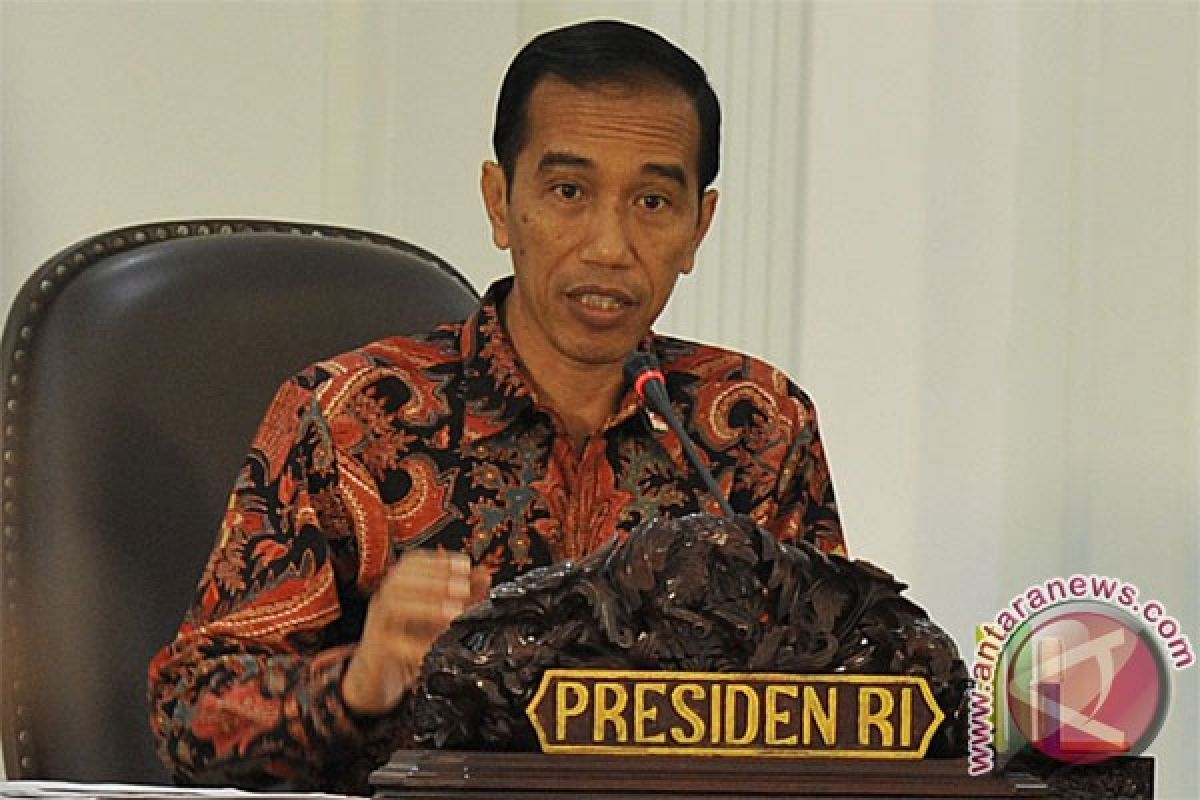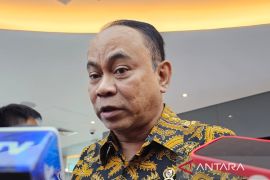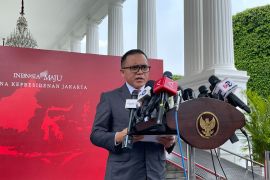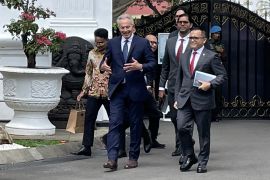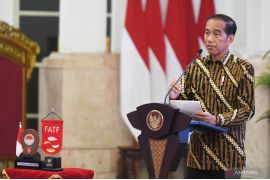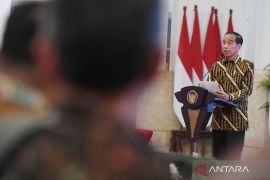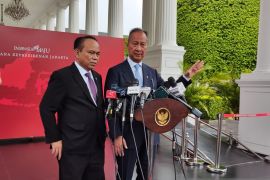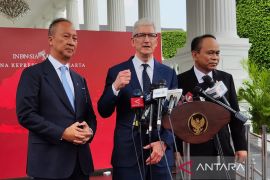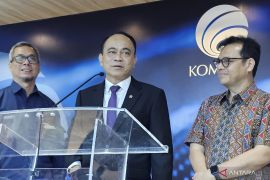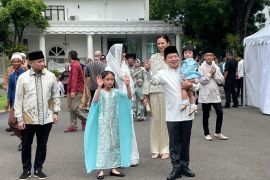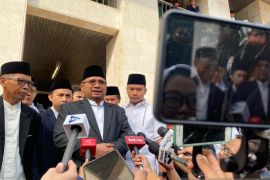President Joko Widodo, or Jokowi as he is better known, is set to attend the Asia-Pacific Economic Cooperation (APEC) Summit 2014 to be held in Beijing on November 10 and 11.
As the president of Indonesia, this would be his first time participating in an international event that will see attendees like the United States President Barack Obama and Russian President Vladimir Putin.
President Jokowi, who is the former governor of Jakarta, replaced Susilo Bambang Yudhoyono following his victory in the presidential election on July 9.
The Director of the Asia-Pacific and Africa Inter-Regional Cooperation of the Ministry of Foreign Affairs, Arto Suryodipuro, said that President Jokowi is scheduled to deliver a speech on Indonesias economic vision for the next five years at the APEC summit.
"Mr. President will highlight the importance of economic integration and connectivity, which is in line with the APECs theme in Beijing," he stated.
After the APEC summit, President Jokowi will head to Myanmar to attend the 25th Association of Southeast Asian Nations (ASEAN) summit in Nay Pyi Taw on November 12 and 13.
According to the Director General of ASEAN of the Ministry of Foreign Affairs, I Gusti Agung Wesaka Puja, President Jokowi will also attend an ASEAN meeting with partner countries and organizations at the summit. These include India, Japan, the United Nations, Australia, East Asian countries, the United States, China, and the ASEAN Plus Three countries (Japan, China and South Korea).
Wesaka Puja pointed out that issues related to maritime and ASEAN development post 2015 will be the primary subjects of discussion at the summit.
"Under Myanmars chairmanship, the focus will be on issues related to the unity of ASEAN member states and building a prosperous community," he added.
The third summit that President Jokowi will attend this month is the G-20 Summit in Brisbane, Australia. Here, he will deliver a speech on the bureaucracy and economic reforms in Solo, Central Java, and the Jakarta Capital Region.
"President Jokowi has been specially asked to talk about his experiences in bureaucracy and economic reforms during his term as the mayor of Solo and the governor of Jakarta," the Director of Economic and Environment Development of the Ministry of Foreign Affairs, Toferry Soetikno, affirmed.
Moreover, while seeing off the president at Halim Perdanakusumah Airport in Jakarta on Saturday, Vice President Jusuf Kalla said, "These meetings are important with regard to our national interests."
He added that at the meetings, Indonesia will seek to increase investment in infrastructure development projects in various regions in the country.
Indonesia is seeking significant investment to carry out various development programs, including the sea toll project that will help to create worldwide maritime axis as envisioned by President Jokowi.
The policy of transforming Indonesia into a maritime axis has attracted the attention of the leaders of some friendly countries, according to President Jokowi.
Conversing with the participants of the national congress of Gadjah Mada University Alumni Family (Kagama) in Kendari, Southeast Sulawesi, on Thursday (November 7), President Jokowi stated that the leaders of friendly countries, including those from Russia, the United States, Japan, China, and Australia, have shown interest in his maritime axis vision and the maritime toll road program.
"I believe that they are curious about the policy because they realized that two-thirds of Indonesian territory is made up of water, a fact that had been overlooked for a long time," the president remarked.
Jokowi further noted that as a new player in the APEC forum, he had received many requests for meetings from numerous Asia-Pacific economic leaders regarding the maritime axis concept. These include requests from Russian President Vladimir Putin and the U. S. President Barack Obama, among others.
"The meetings will eventually relate to the concept of maritime axis and the maritime toll program," the president affirmed, admitting that many foreign parties, including China, had expressed interest in establishing ties.
"While they have the 21st century Maritime Silk Route, we have our maritime axis vision. So they want to cooperate with us," Jokowi explained.
In addition, Cabinet Secretary Andi Wijayanto said, "The president will specifically integrate Indonesias concept of the world maritime axis with Chinas concept of the 21st century New Silk Road."
Wijayanto pointed out that besides pitching his idea for infrastructure development, Jokowi will also meet with a number of heads of states and heads of governments.
"The president will likely hold bilateral meetings with the Russian and the U. S. presidents. He will also specifically meet with Chinas president and prime minister. He also has plans to visit the Chinese industrial zone in Tianjin," the cabinet secretary revealed.
At the ASEAN summit in Myanmar, where a series of meetings such as those between ASEAN and its partners and the East Asia summit will be held, Jokowi will explain the doctrine of Indonesias new foreign policy more elaborately, Wijayanto stated, adding that he will use the platform of the East Asia summit to explain it.
Next on Jokowis agenda is the G-20 Summit in Brisbane, Australia, where he will hold bilateral talks with the Australian and Spanish prime ministers.
During the G-20 summit, Jokowi will address the issues of the global economic situation and Indonesias hope for cooperation with G-20 countries to overcome the unfavorable conditions, particularly economic challenges in 2015.
At a press conference on Indonesias participation in the APEC, ASEAN and G-20 summits, Ministry of Foreign Affairs official Arto Suryodipuro said that maritime issues and connectivity would be the central subjects President Jokowi would raise at the meetings.
The maritime sector has become President Jokowis prime focus with regard to his idea of restoring Indonesias glory in the field.
The transition team of his government had estimated that some two thousand trillion rupiah would be needed to develop the maritime sector, including ports and sea toll lanes.
The funds will be needed to build 224 new ports, which cannot be covered by state port company PT Pelindo, to revitalize 50 ports in the eastern, central and western regions of Indonesia, and to develop feeder ports in the eastern regions of Indonesia.
(T.H-YH/INE/B003)
Reporter: Yoseph Hariyadi
Editor: Priyambodo RH
Copyright © ANTARA 2014
